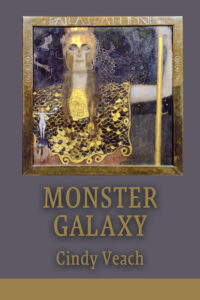 Monster Galaxy by Cindy Veach
Monster Galaxy by Cindy Veach
Review by Ruth Hoberman
On the cover of Monster Galaxy, Cindy Veach’s new book of poems, Athena glows in gold armor, having sprung powerful and fully formed from her father Zeus’s forehead. The poems in Monster Galaxy are similarly powerful, fully formed, and haunted by the elusive father whose tastes and demands shaped the poet’s childhood.
Paranoid, overprotective, at times sexist—he’s a flawed husband and father but loved, and his death leaves the speaker stunned by his absence. “I don’t know how it happens that a big man,/a man so present,/lies down and lies down,” Veach writes in “I Think I Was a Good Daughter”(28). In “Legacy,” she wonders what became of the cast-iron skillets he collected. He died, she explains, “before the discovery of a rare monster galaxy,” a long-dead bunch of stars evident now only as “dark matter” (37). This dark matter is invisible but its immense gravitational force remains. Similarly, her father’s skillets with their “constellation of crumbs” may be lost, but their owner remains, a needy interlocutor crucial to the poet’s effort to understand and forgive herself.
These are intricately constructed but accessible poems. Veach has a gift for interweaving narrative threads: skillets with galaxies; past with present; trivial details with cosmic scale; anger with acceptance. “Self-Portrait as Daytime Television,” for example, juxtaposes the loss of her brother in adulthood with his toddling “into the bee’s nest” and being rushed to the emergency room. Then that memory dissolves into a memory of the “stupid way/the Three Stooges slapped each other silly Saturday/mornings in black-and-white” (14). The images suggest both the era (early 1960s) and the grotesqueness of childhood itself: how incomprehensible the world can seem then with its silly tv shows and adults behaving oddly.
Monster Galaxy is divided into three sections. The first two depict the speaker as an outsider never quite in synch with either her peers or her family. She tries to be the “good girl,” a doomed effort in a society making such contradictory demands on girls. Penny Robinson, the young daughter in the mid-sixties tv show Lost in Space, provides her with an alter ego and epigraphs for two poems. But it’s not just the speaker who’s confused; in “The Phantom Family,” the whole family is lost in space, their car a space capsule tossed by “solar winds”:
the compass needle shivered Warning! Warning! when
charged particles battered our nuclear ship when dad
was at the wheel when mom was confirming
coordinates—We’re lost, aren’t we? when I leaned on my
sister who leaned on our brother Don’t leave me alone
when the hum of the car when their muffled voices when
we feel asleep when we felt safe when we had parents (25)
In the poem’s second half, the same lines repeat in reverse order, sandwiching those moments of safety—“when we had parents”—between lines expressing fear and disorientation. The many “when’s” and the lack of punctuation destabilize the syntax, trapping the reader in the poem’s claustrophobic turbulence. I had one of those “nuclear families” too: the kind that looks safe but is, in fact, as packed with explosive materials as a nuclear bomb.
In its final third, the book’s focus shifts somewhat from the father as “monster galaxy” to the speaker as a “galaxy of monsters.” What happens to a woman, several poems ask, once she is no longer defined by her role as mother? Once her body has sagged and softened? “I am still blooming—” Veach insists (53), but she is also, as one poem puts it, “a coven of too-muchness,” a “hat trick of monsters” (48). The book’s epigraph, from Adrienne Rich’s “Planetarium,” evokes western culture’s tendency to equate women with monstrosity: “A woman in the shape of a monster/a monster in the shape of a woman/the skies are full of them.” From outside and in, the monsters come—pressuring women to do this or that, but also, when reclaimed, a source of strength. As the book’s penultimate poem asks,
…Who swallowed
whom? Is there a woman inside every monster or monsters
inside every woman? What if both things can be true.
A reticulation of wrinkles and collagen, wisdom
and faux pas, fear and ferocity. (60)
This is Veach’s third full-length collection of poems. Her Kind (2021) explored the Salem witch trials; Gloved Against Blood (2017), girls working in a Massachusetts cotton mill. What I admire is her consistent ability to frame women’s experiences in complex, multiple ways. Neither victim nor superwoman, Veach’s speaker in Monster Galaxy is meditative, full of questions, honest, and ultimately unafraid to look back and say—as she does in the book’s last line—“I have done the best I can” (61).
Monster Galaxy by Cindy Veach
MoonPath Press, 2025, 69 pp. $19.99 [paper]
ISBN 9798989948796
Ruth Hoberman is a writer living in Newtonville, MA. Since her 2015 retirement from Eastern Illinois University, she has published poems and essays in various journals, most recently in Comstock Review, SWWIM Every Day, Pine Row Review, Constellations, and Salamander.
